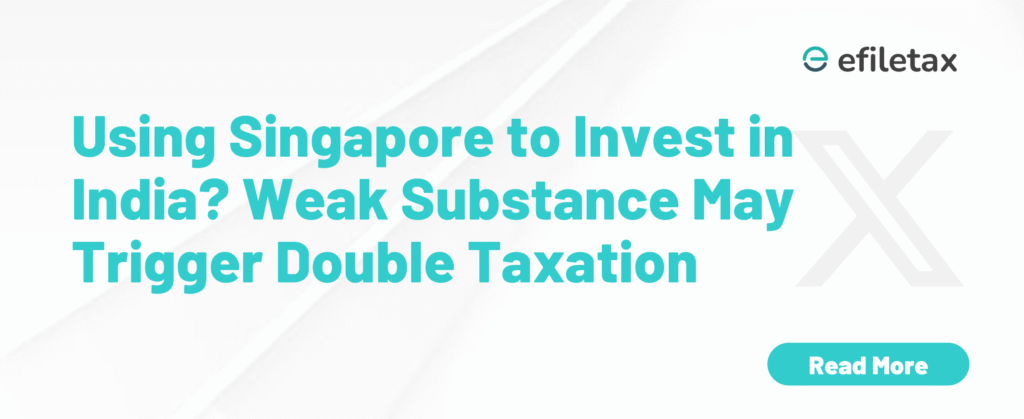
Are Singapore Route Investments in India at Risk?
Singapore economic substance rules are now under tighter scrutiny — and that could reshape how multinational companies (MNCs) route their investments into India.
Until now, many global firms used the Singapore route to access favourable tax treaty benefits under the India–Singapore DTAA (Double Taxation Avoidance Agreement). But with Singapore tightening its “economic substance” requirements, that convenience may soon fade.
What Are Economic Substance Rules?
Economic substance rules require that a company claiming tax residency in a country must have:
- Real economic activities there (not just a mailbox address)
- Qualified staff, office space, and active management
- Commercial rationale for being based in that jurisdiction
If an entity fails this test, it may be flagged as a “shell company” or “conduit”, which could lead Indian authorities to deny tax treaty benefits.
Why It Matters for MNCs Investing in India
India has long scrutinised treaty shopping and round-tripping via Mauritius, Cyprus, and Singapore. But now:
- CBDT is expected to revisit General Anti-Avoidance Rules (GAAR) in such cases
- Treaty benefits (like reduced capital gains tax) may not apply
- Companies may face full domestic tax rates in India
- Risks of double taxation rise if Singapore also taxes without full relief
Official Standpoint: What CBDT and Courts Have Said
- CBDT Circular No. 789/2000 (related to Mauritius) clarified that tax residency certificate (TRC) is sufficient.
- However, Supreme Court in Azadi Bachao Andolan (2003) upheld treaty benefits only if no abuse.
- Later, Finance Act 2012 introduced GAAR (Section 95–102 of Income Tax Act) to check misuse.
Now, mere possession of a TRC is not enough — actual economic substance and commercial purpose matter.
Example: Capital Gains Exemption Under India-Singapore Treaty
| Condition | Earlier Benefit | Risk Under New Rules |
|---|---|---|
| Singapore Holding Co. owns Indian shares | 0% or reduced capital gains tax in India | May lose exemption if shell status found |
| No real business in Singapore | Still got TRC-based benefits | Can now be denied by Indian tax officers |
| Genuine operational presence | Exemption continues | Must prove substance and purpose |
Expert View: Ensure Substance or Face Full Tax Hit
“Firms using Singapore as a conduit must now reassess their group structure. Have a real board, local staff, and operational setup — or Indian tax benefits may disappear.”
— CA Karan Mahajan, International Tax Advisor
How Businesses Can Stay Compliant
To continue enjoying treaty relief, ensure:
- Actual business operations in Singapore
- Maintain active board meetings, preferably in Singapore
- Pay reasonable remuneration to Singapore-based directors/staff
- Keep books and audit in Singapore
- Have a commercial justification for the Singapore structure
What This Means for Indian Tax Authorities
Expect tighter scrutiny of cross-border investments. If companies fail the economic substance test, the Income Tax Department may:
- Apply GAAR provisions
- Deny capital gains exemptions
- Demand tax at 30% or higher rates
- Initiate audits or litigation
Internal Restructuring Ahead?
Global MNCs and Indian start-ups backed by overseas investors should:
- Review holding company setups
- Consider alternate jurisdictions with better substance records
- Consult tax professionals on substance compliance
Summary
Singapore’s new economic substance rules may restrict India tax treaty benefits. MNCs routing investments via Singapore risk higher taxes and GAAR scrutiny without real business operations.
FAQs
Q1: Does a TRC still guarantee tax relief under the India–Singapore DTAA?
No. As per GAAR and recent trends, TRC alone is not sufficient — economic substance is essential.
Q2: What happens if a Singapore entity is found to be a shell company?
Indian tax authorities may deny treaty benefits and apply domestic tax laws, leading to higher tax outgo.
Q3: Is Mauritius affected by similar rules?
Yes. Economic substance conditions apply there too post-2017 protocol amendments with India.
Don’t Risk Costly Tax Hits – Consult Experts Now
If your company has investments routed via Singapore, get a tax structure review done. Our Efiletax experts can guide you through:
- GAAR risk assessments
- Treaty benefit eligibility
- Economic substance documentation